Telemedicine transformed the health industry by making it possible for doctors to provide remote care for patients without weakening strict privacy procedures. Best HIPAA-compliant telehealth platform provides secure video appointments, messaging, and document transfer to protect personal patient data. Clinics, doctors, therapists, hospitals, and healthcare companies committed to providing efficient virtual services need the software.
The 15 best HIPAA-compliant telehealth platforms are selected on the basis of security, ease of use, integration with EHR, price, and scalability. They are made to support a high number of healthcare providers from single physicians to a high hospital chain. As they are HIPAA compliant, they provide patient confidentiality as well as ease of health care services.
Criteria for Selecting the Best HIPAA Compliant Telehealth Platforms
Following are some of the criteria that should be kept into consideration before opting for the best HIPAA-Compliant telehealth platforms:
- HIPAA compliance: Adherence to legal and regulatory requirements for patient data and confidentiality safeguarding.
- End-to-end encryption: Encryption of data, messaging, and video streaming for protection against unauthorized access.
- Ease of use: Easy and intuitive platform for both practitioners and patients for facilitating comfortable virtual consultations.
- EHR integration: EHR support for easy handling of patient data.
- Scalability: Provides support for individual physicians, small practices, and large healthcare organizations.
- Multi-device compatibility: Provides desktop, tablet, and smartphone platform support to make it more convenient.
- Virtual waiting rooms: Provides simplified patient intake and queue management. Healthcare facilities can enhance this experience by implementing WaitWell digital queue management systems that streamline the entire patient flow process.
- Secure messaging & document sharing: Provides secure messaging and document sharing between patients and providers.
- Appointment scheduling & reminders: Automates scheduling and reminders to reduce no-shows.
- White-labeling & custom branding: Allows clinics to brand the platform so that they can hold on to their identity.
- Video & audio quality: Low-latency, high-definition video and audio for seamless consultations.
- Billing & insurance integration: Allows reimbursement, copay collection, and claim filing with insurance.
- AI & analytics tools: Allows for patient trend insights, appointment optimization, and engagement rates.
- Customer support & training: Onboarding support and 24/7 support to enable easy rollout.
- Price & affordability flexibility: Competitive pricing with free trial, pay-per-use, or subscription.
List of 13 Best HIPAA-Compliant Telehealth Platforms
1. Doxy.me
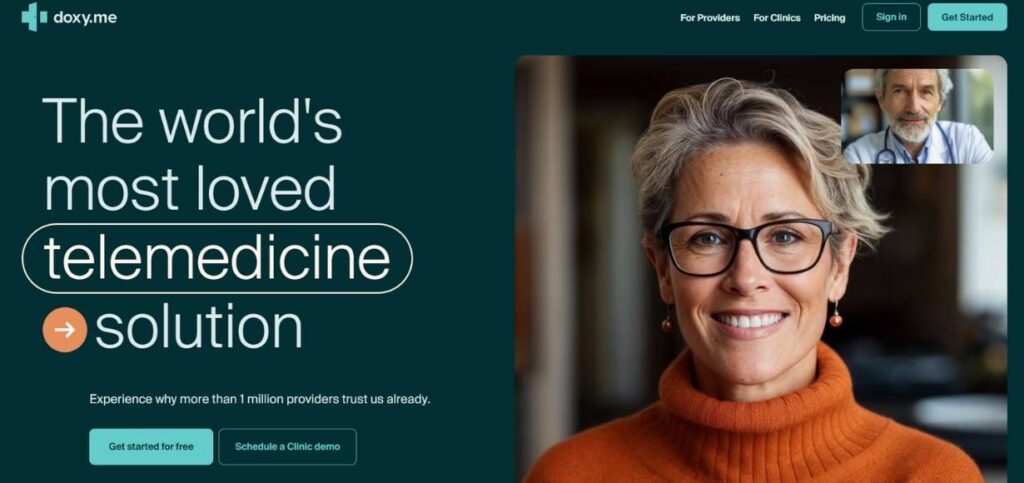
Doxy.me is a secure, one of the web-based HIPAA-Compliant Telehealth Platforms intended for healthcare providers. It is download-free, so providers and patients can easily access it. It has the capability for video conferencing, live messaging, and file exchange while maintaining complete HIPAA compliance. It has free and paid versions with added features such as HD quality, teleconsent, and patient queue. Doxy.me is EHR system-compatible and has a streamlined, easy-to-use interface for real-time virtual consultations.
Key Features:
- Browser-based telehealth solution
- HIPAA, GDPR, and HITECH compliance
- Virtual waiting rooms for patients
- Secure HD video and audio calls
Pros:
- Easy to use with no installation required
- Free version available
Cons:
- Limited advanced features in the free plan
- Video quality can vary based on internet connection
Pricing:
Free basic plan, premium plans start at ₹1,990 Per month
Who Should Use It?
Solo practitioners, small clinics, and therapists looking for an easy-to-use telehealth solution.
Website: https://doxy.me/en/
2. Zoom for Healthcare
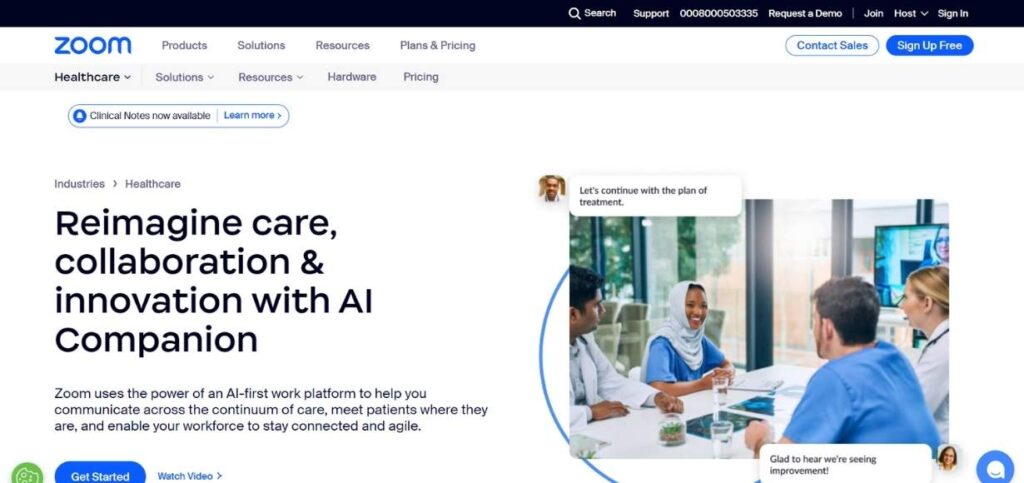
Zoom for Healthcare is the HIPAA-compliant version of Zoom specifically tailored for healthcare providers to use with their patients. It has high-definition video conferencing, end-to-end encryption, and secure patient messaging. It supports EHR-system integration and allows virtual waiting rooms, breakout rooms, and screen sharing. It’s easy to use and scale, therefore ideal for single providers and large health organizations. It provides group therapy sessions and remote medical training.
Key Features:
- Encrypted video calls with HIPAA compliance
- Virtual waiting rooms and breakout rooms
- Screen sharing and session recording
- EHR integration capabilities
Pros:
- High-quality video and audio
- Scalable for large organizations
Cons:
- Requires a paid plan for HIPAA compliance
- Learning curve for non-tech-savvy users
Pricing:
Custom pricing
Who Should Use It?
Large healthcare organizations, hospitals, and clinics needing a reliable, scalable telehealth solution.
Website: https://www.zoom.com/en/industry/healthcare/
3. SimplePractice
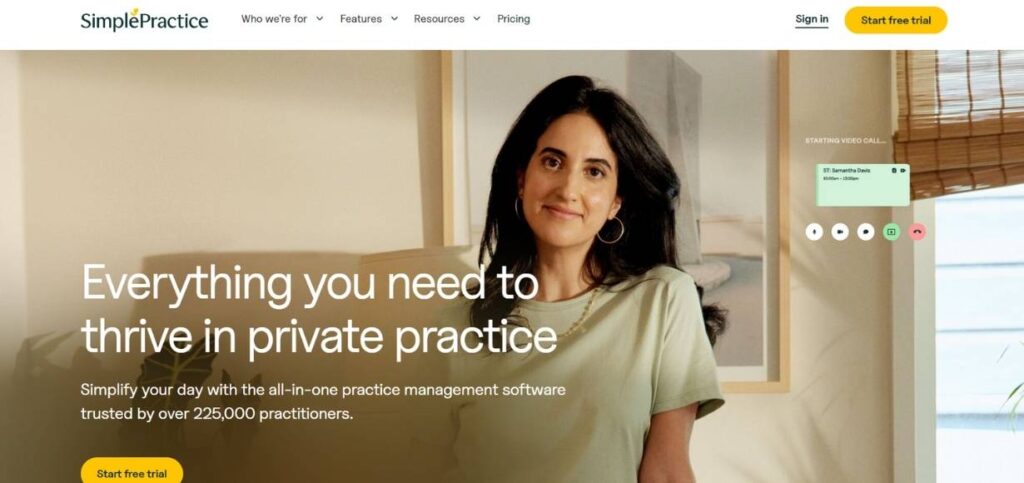
SimplePractice is a HIPAA-secure telehealth platform built for therapists, counselors, and medical professionals. It provides secure video conferencing, scheduling, automatic billing, and documentation. Patients can participate in sessions through a straightforward link without the need for extra software. SimplePractice also includes customizable client intake forms, client portals, and insurance claim management, so it is a complete solution for solo practitioners and small medical practices.
Key Features:
- Secure video appointments with screen sharing
- Integrated billing and insurance claim processing
- Customizable client portal for scheduling and document management
- Mobile app for on-the-go access
Pros:
- All-in-one practice management solution
- User-friendly interface
Cons:
- Limited customization for larger practices
- Higher cost compared to some competitors
Pricing:
Starts at $29.40/month
Who Should Use It?
Therapists, psychologists, and small private practices looking for an all-in-one solution.
Website: https://www.simplepractice.com/
4. VSee
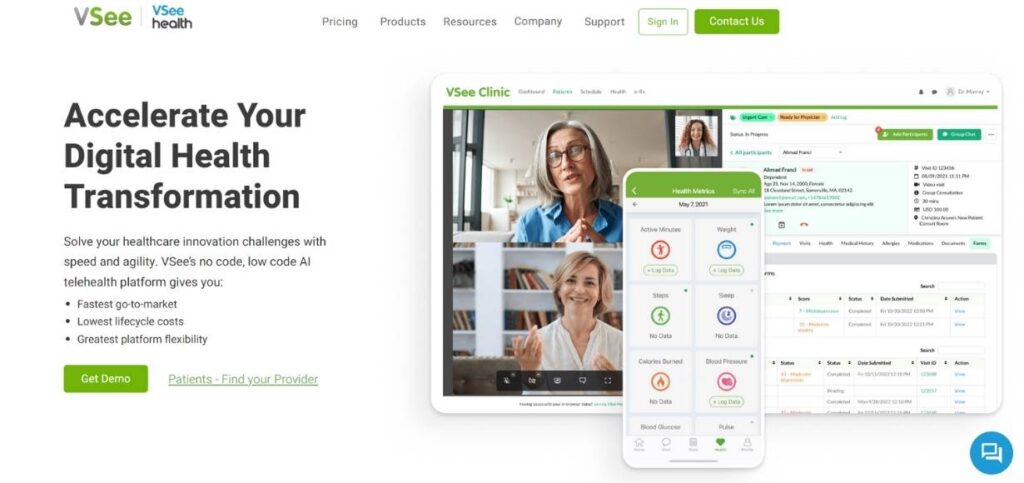
VSee is a HIPAA-compliant telehealth platform that is optimized for secure video consultations. It has features such as screen sharing, instant messaging, and integration with EHRs. VSee is utilized by most hospitals, clinics, and remote healthcare professionals. It has multi-party call support and telemedicine cart integration for sophisticated diagnostics. It also has patient self-scheduling and remote monitoring capabilities, which make it a great option for large healthcare organizations.
Key Features:
- Encrypted video calls with screen sharing
- EHR integration and API support
- Remote patient monitoring with connected medical devices
- Virtual waiting rooms
Pros:
- Suitable for telemedicine and remote diagnostics
- Free basic version available
Cons:
- UI feels outdated compared to competitors
- Limited support in the free plan
Pricing:
Free basic plan; paid plans start at $49/month
Who Should Use It?
Healthcare providers, hospitals, and specialists conducting remote diagnostics.
Website: https://vsee.com/
5. MDLIVE

MDLIVE is a top HIPAA-compliant telemedicine platform that provides virtual consultations with physicians, therapists, and psychiatrists. It has 24/7 access to healthcare professionals for non-emergency situations. The appointments can be booked via the mobile app or website. The platform is EHR system- and insurance network-integrated, which makes it convenient to deal with patients. MDLIVE’s symptom checker powered by AI enables patients to get accurate initial assessments prior to consultation.
Key Features:
- On-demand virtual doctor visits
- 24/7 availability for urgent care needs
- Prescription services and pharmacy integration
- Secure mobile app for patient access
Pros:
- Quick access to licensed professionals
- No subscription required for patients
Cons:
- Pricing per visit can be high without insurance
- Not ideal for long-term patient care management
Pricing:
Pay-per-visit model; pricing varies by service
Who Should Use It?
Patients seeking convenient, on-demand virtual healthcare.
Website: https://www.mdlive.com/
6. Teladoc Health
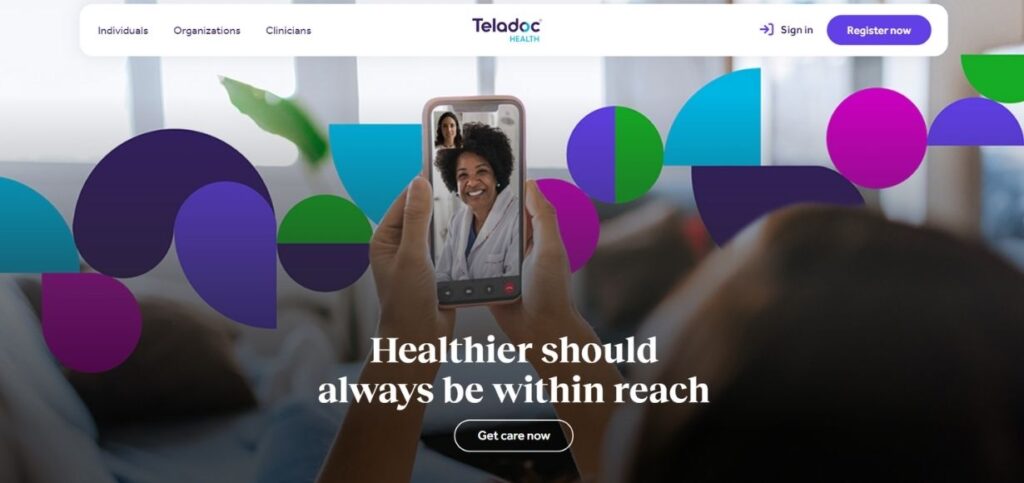
Teladoc Health is a well-known telehealth platform offering virtual medical consultations, mental health care, and dermatology evaluations. It is HIPAA-compliant and offers secure video calls, messaging, and remote patient monitoring. Teladoc is utilized by employers, insurers, and healthcare organizations to offer on-demand medical care. The platform provides AI-based health insights and chronic disease management capabilities, making it an end-to-end telehealth solution.
Key Features:
- 24/7 virtual doctor and mental health visits
- AI-driven health insights
- Chronic disease management tools
- Mobile and web-based access
Pros:
- Large network of doctors across specialties
- Insurance compatibility for reduced costs
Cons:
- Not ideal for ongoing therapy sessions
- Appointment wait times can vary
Pricing:
Varies based on insurance coverage and services
Who Should Use It?
Patients seeking general medical advice and chronic care support.
Website: https://www.teladochealth.com/
7. Amwell
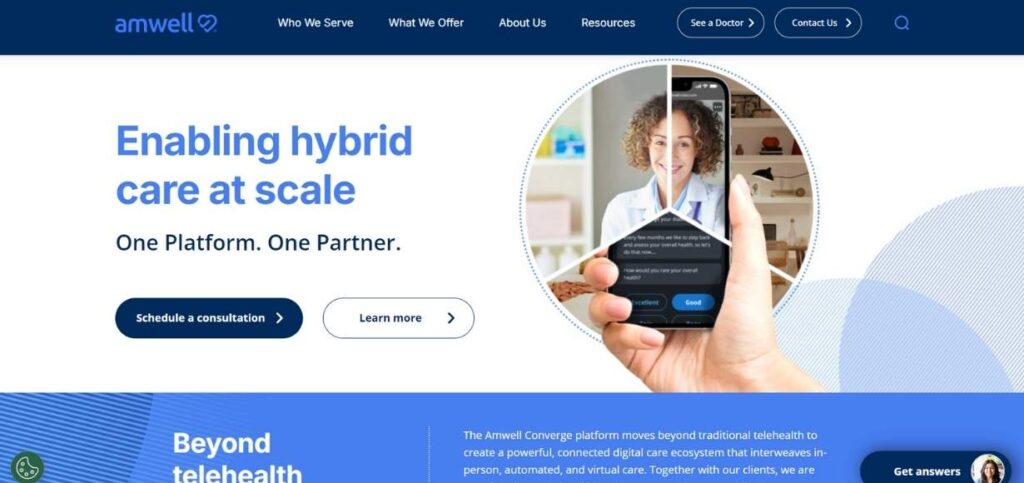
Amwell is a HIPAA-compliant telemedicine platform used by freestanding providers, hospitals, and health systems. It provides EHR integration, AI-powered triage technology, and high-definition video consults. The platform provides 24/7 access to behavioral health services and healthcare providers. Amwell’s electronic management of prescriptions enables physicians to prescribe pharmacy prescriptions remotely. Its ease of use enables it to be an effective telemedicine product for patients and providers.
Key Features:
- On-demand medical and behavioral health services
- Prescription and pharmacy integration
- Supports employer and health system partnerships
- AI-driven symptom checker
Pros:
- Wide range of healthcare services
- Insurance coverage for many visits
Cons:
- No free plan available
- Some services may have long wait times
Pricing:
Pay-per-visit; prices vary by service and insurance coverage
Who Should Use It?
Individuals, employers, and healthcare providers looking for a scalable telehealth service.
Website: https://business.amwell.com/
8. Updox

Updox is a secure, HIPAA-compliant telehealth platform aimed at secure messaging with patients. It supports video conferencing, secure texting, appointment reminders, and document exchange. Updox may also integrate with electronic health records for smooth workflow management. Updox is perfectly suited for small and mid-sized healthcare practices with the need for a low-cost telehealth option. Updox also includes digital fax and patient intake forms, enhancing administrative effectiveness even more.
Key Features:
- Secure video consultations
- Text and email appointment reminders
- EHR integration for streamlined workflows
- Paperless document management
Pros:
- Strong communication and messaging tools
- Works well with existing medical software
Cons:
- Higher cost compared to similar platforms
- Learning curve for new users
Pricing:
Custom pricing based on practice size
Who Should Use It?
Private practices and medical offices looking for patient engagement tools.
Website: https://www.updox.com/
9. Spruce Health
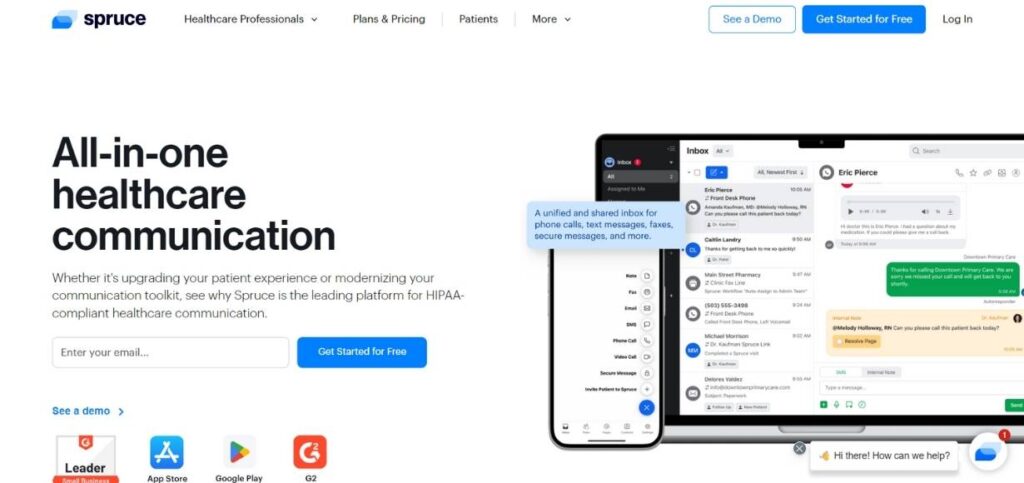
Spruce Health is a HIPAA-compliant telemedicine solution that offers tools for secure messaging, video consultation, and collaborative teamwork. It supports multiple-channel communications such as text messages, emails, and phone calls in one common environment. EHR system integration and automated clinical workflows are offered by Spruce Health for enhanced patient care efficiency. It’s ideal for implementation in small practices and mental health professionals who are in need of end-to-end communication solutions.
Key Features:
- Encrypted messaging and video consultations
- AI-powered automated patient triage
- Customizable voicemail and call forwarding
- EHR integration
Pros:
- Great for multi-channel communication
- Easy to use for both patients and providers
Cons:
- Limited advanced telehealth features
- Higher pricing for small practices
Pricing:
Starts at $24/month per provider
Who Should Use It?
Small medical clinics and individual practitioners needing a secure messaging tool.
Website: https://sprucehealth.com/
10. eVisit
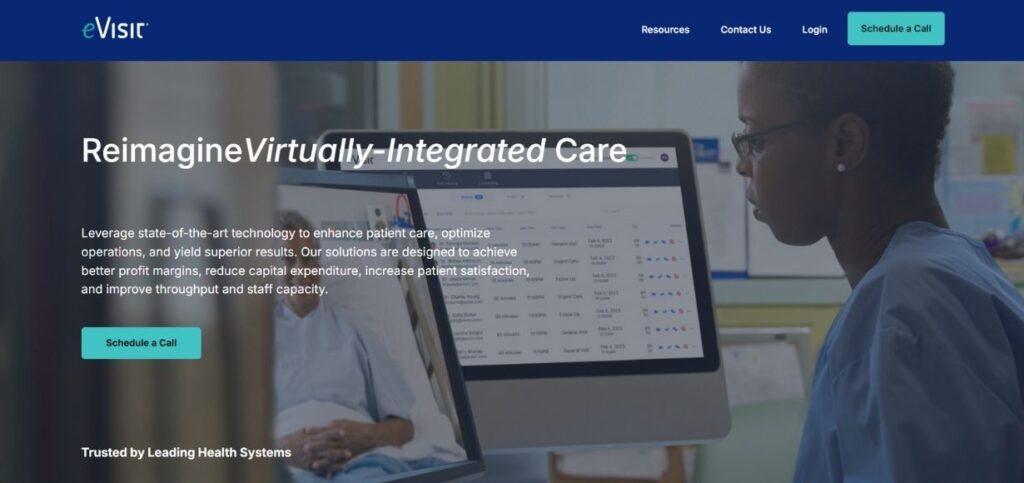
The enterprise telehealth platform named eVisit operates under HIPAA regulations. Through its platform patients can access video consultations and track their appointments while using its triage system. eVisit combines with electronic health records systems and generates immediate analytical data to monitor patient progress. This platform suits hospital networks with multiple healthcare providers. Users have access to distanced monitoring systems that enable the management of chronic diseases.
Key Features:
- Secure video consultations with multi-provider support
- Customizable patient intake and scheduling
- EHR integration for seamless workflows
- AI-powered analytics for performance tracking
Pros:
- Designed for enterprise-level healthcare organizations
- Scalable for large teams and multi-location practices
Cons:
- Higher cost for small practices
- Requires training for full utilization
Pricing:
Custom pricing based on organization size and needs
Who Should Use It?
Hospitals, healthcare networks, and large medical groups.
Website: https://evisit.com/
11. Chiron Health
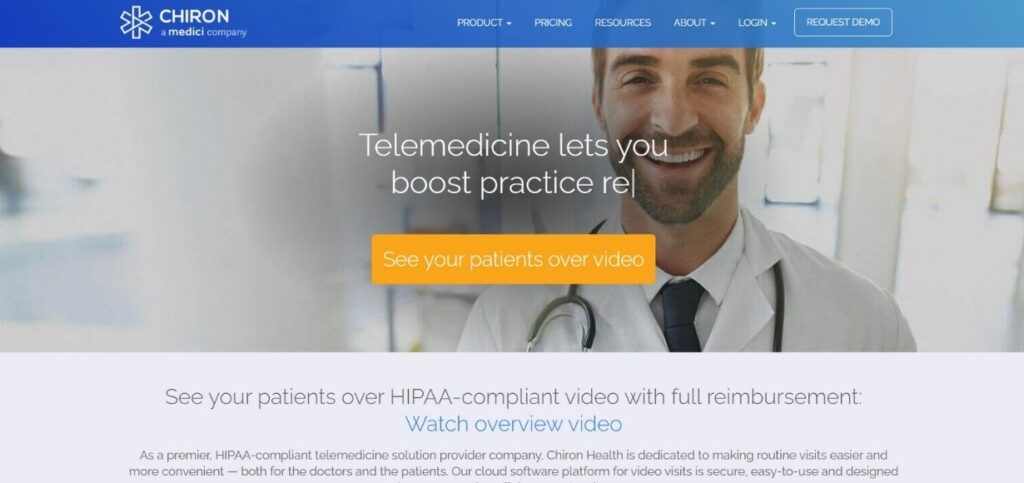
Chiron Health is a HIPAA-compliant, reimbursement- and billing-savvy telehealth platform. Secure video visits, patient scheduling, and automated documentation are offered by the platform. Highly-rated EHR systems are supported by the platform through integration, with streamlined workflow being offered to healthcare providers. Chiron Health helps reduce claims and administrative burdens through automated insurance verification. It is immensely helpful to healthcare providers who seek to expand virtual care without compromising on meeting reimbursement regulations and protecting patient information.
Key Features:
- Secure video appointments with automated reminders
- Insurance verification and reimbursement tracking
- EHR and practice management system integration
- Custom branding options for healthcare providers
Pros:
- Strong insurance billing and compliance features
- Good for recurring patient follow-ups
Cons:
- Limited support for solo practitioners
- No free trial available
Pricing:
Custom pricing based on provider needs
Who Should Use It?
Clinics and healthcare providers focused on insurance-covered virtual care.
Website: https://www.chironhealth.com/
12. Mend
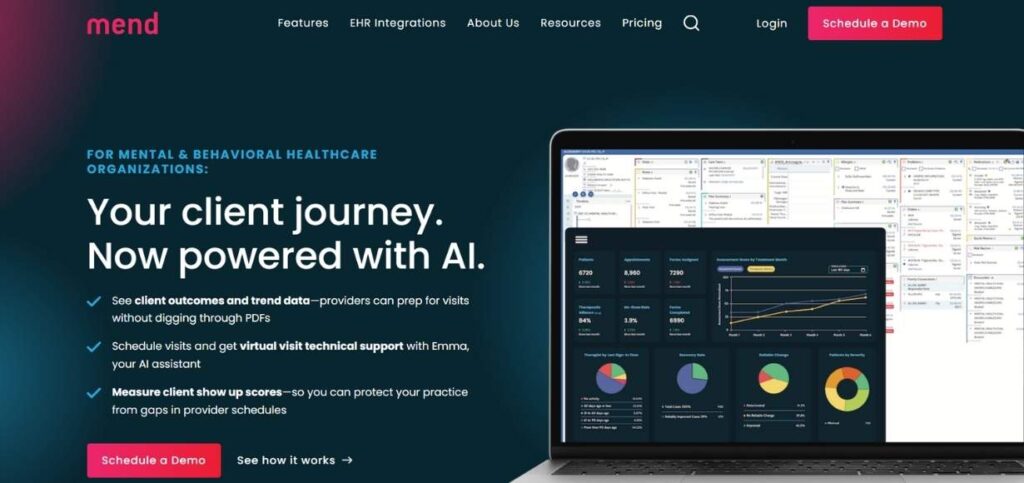
Mend is an end-to-end HIPAA-compliant telehealth platform focused on patient engagement and effective virtual care. It offers secure video visits, automated scheduling, and predictive analytics to reduce no-shows. Mend is integrated with EHR systems and comes with multi-channel reminders via SMS and email. With AI-powered patient adherence features and seamless provider workflows, Mend is an ideal solution for hospitals, clinics, and behavioral health providers seeking effective telehealth solutions.
Key Features:
- Secure video calls with automated appointment reminders
- AI-powered no-show prediction
- Digital intake forms and e-signatures
- Multi-channel patient communication (text, email, voice)
Pros:
- Advanced automation reduces administrative workload
- Supports multi-specialty practices
Cons:
- Pricing may be high for solo practitioners
- Some features require additional costs
Pricing:
Custom pricing based on provider size
Who Should Use It?
Healthcare organizations looking to optimize patient engagement and reduce no-shows.
Website: https://www.mend.com/
13. SecureVideo
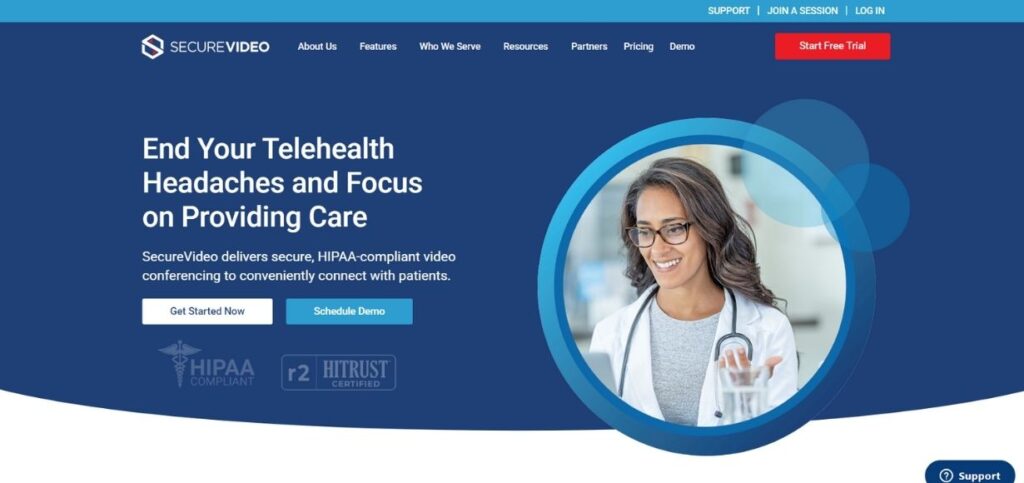
SecureVideo is a HIPAA-compliant telehealth service offering encrypted video conferencing, appointment scheduling, and session recording for healthcare providers. It has integration with EHR systems and support for group therapy sessions, so it’s suitable for medical offices and therapy clinics. It has patient intake forms and secure messaging for patient communication. SecureVideo is an ideal solution for telepsychiatry and mental health services that ensures compliance and security in remote patient engagement.
Key Features:
- Encrypted video calls with session recording
- EHR and workflow automation integrations
- Custom branding for healthcare providers
- Secure file sharing and messaging
Pros:
- High level of security and compliance
- Supports large healthcare teams
Cons:
- Pricing can be expensive for small practices
- Interface can feel outdated
Pricing:
Starts at $29.95/month per user
Who Should Use It?
Healthcare professionals needing high-security tele.
Website: https://www.securevideo.com/
Comparison Between Best HIPAA-Compliant Telehealth Platforms
Here’s a comparison table for the best HIPAA-compliant telehealth platforms, detailing their features, pricing, use cases, and official websites.
| Platform | Key Features | Pricing | Best For | Website |
| Doxy.me | Free & paid plans, waiting rooms, EHR integration | Free, paid plans start at ₹1,990Per month | Small clinics, solo practitioners | doxy.me |
| Zoom for Healthcare | HIPAA-compliant video, EHR integration, secure cloud storage | Custom pricing | Hospitals, large clinics, therapy sessions | zoom.us/healthcare |
| SimplePractice | Telehealth, scheduling, client notes, billing | Starts at $29.40/month | Therapists, private practices | simplepractice.com |
| VSee | Secure video, e-prescriptions, patient portals | Starts at $29/per provider/ per month | Hospitals, government agencies | vsee.com |
| MDLIVE | Virtual urgent care, mental health, dermatology | Subscription-based, insurance covered | Large healthcare providers, employers | mdlive.com |
| Teladoc Health | 24/7 access, mental health & chronic care management | Subscription-based | Employers, insurers, large health networks | teladochealth.com |
| Amwell | Video consultations, AI-powered triage, insurance integration | Custom pricing | Hospitals, insurers, enterprise healthcare | amwell.com |
| Updox | Telehealth, faxing, messaging, patient reminders | Custom pricing | Independent physicians, small clinics | updox.com |
| Spruce Health | Telehealth, secure messaging, team collaboration | Starts at $24/month | Primary care, mental health providers | sprucehealth.com |
| eVisit | Video visits, patient triage, EHR integration | Custom pricing | Enterprise healthcare, hospitals | evisit.com |
| Chiron Health | Insurance billing, secure video, EHR integration | Custom pricing | Medical practices needing reimbursement support | chironhealth.com |
| Mend | AI-driven no-show reduction, appointment scheduling | Custom pricing | Hospitals, mental health providers | mend.com |
| SecureVideo | Encrypted video calls, session recording, intake forms | Starts at $39/month | Telepsychiatry, therapy clinics | securevideo.com |
Conclusion
Selecting the best HIPAA-compliant telehealth platform relies on individual healthcare provider requirements. Large-scale hospitals and enterprise health systems find complete solutions through Teladoc Health and Amwell with premium integrations. Solo practices and small clinics should use Doxy.me or SimplePractice due to their affordability and simplicity. Providers requiring secure high-definition video conferencing find Zoom for Healthcare and Doximity Dialer to be top choices.
TheraNest and Spruce Health are available to mental health professionals to rely upon for advanced features. eVisit and AthenaTelehealth are geared toward enterprise providers that require telemedicine solutions on a full scale. In the end, the selection of optimal software depends on feature assessment, compliance, cost, and user interface to facilitate seamless and secure virtual care for providers and patients alike.
FAQs
1. What is a HIPAA-compliant telehealth platform?
A HIPAA-compliant telehealth platform provides secure communication between healthcare providers and patients by adhering to the Health Insurance Portability and Accountability Act (HIPAA) guidelines. The platforms employ encryption, access controls, and secure data storage to safeguard patient health information.
2. Which telehealth platforms are HIPAA-compliant?
Some of the best HIPAA-compliant telehealth platforms are Teladoc Health, Amwell, and Doxy.me, Zoom for Healthcare, MDLIVE, eVisit, and Spruce Health. These platforms provide secure video consultations, messaging, and data protection capabilities.
3. How do I select the best HIPAA-compliant telehealth platform?
The best HIPAA-compliant telehealth platform have security measures, usability, EHR system integration, cost, and special requirements such as mental health treatment or extensive hospital utilization. Make sure that the platform offers Business Associate Agreements (BAA) to ensure HIPAA compliance.
4. Are free telehealth platforms HIPAA-compliant?
A few free telehealth platforms, such as Doxy.me (light version), support HIPAA compliance but with less functionality. Their paid versions commonly include stronger security, improved video quality, and more practice management tools.
5. Do HIPAA-compliant telehealth platforms support integration with EHR systems?
Yes, most platforms such as AthenaTelehealth, eClinicalWorks Healow, and Kareo Telehealth support electronic health record (EHR) system integration to facilitate smooth patient data management, scheduling, and billing.

